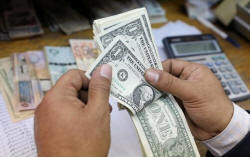|
Dollar steadies after
worst fall in two months
 Send a link to a friend
Send a link to a friend
 [March 16, 2017]
By Ritvik Carvalho [March 16, 2017]
By Ritvik Carvalho
LONDON
(Reuters) - The dollar recovered from a one-month low on Thursday as
investors bought the currency on the back of sharp falls prompted by the
U.S. Federal Reserve's failure to give a hawkish message on further rate
rises.
The dollar index which measures its strength against a basket of major
currencies saw its biggest one-day fall in two months on Wednesday and
the euro, consistently resistant to dollar strength since November,
jumped by the most in nine months.
The euro was also buoyed by the Dutch election which gave Prime Minister
Mark Rutte a victory over far-right rival Geert Wilders.
But dealers said much of that looked to have been investors taking some
profit on the large bets taken on the dollar since November and again in
the last fortnight [IMM/FX], in expectation that the Fed would raise
rates more sharply than previously expected going forward.
"It seems to us that this is a classic 'buy the rumor, sell the fact'
scenario as we cannot help but think the market is heavily long of
dollars," said Stephen Simonis, chief currency consultant with online FX
trader FXDD Global.

"While the dollar sell off may last for a day or two our thinking is
that buying these ... dips is still a good strategy."
In early trade in Europe, the dollar index recovered all its losses
since the close of U.S. trade to stand roughly steady on the day at
100.69. <.DXY>
It was a quarter percent higher at $1.0720 per euro and flat at 113.39
yen. <JPY=>
The euro rose 1.2 percent overnight as exit polls showed Rutte fending
off Wilders anti-Islam and anti-EU party, easing worries about the
progress of right wing populists across the euro zone, many of whom
oppose euro membership.
"The market is relieved. The Dutch election result was consistent with
the opinion polling, and obviously the Fed has delivered a rate hike,
but in its most dovish form," said Bank of America G10 currency
strategist Kamal Sharma.
[to top of second column] |

A man counts U.S dollar bills at a money exchange office in central
Cairo, Egypt, March 7, 2017. REUTERS/Mohamed Abd El Ghany

"Ultimately, the near term is going to be dominated by French election
risks. So we still see that the euro is likely to trade lower heading
into those elections."
Investors lodged large bets on the dollar after Donald Trump's U.S.
presidential election win last year, expecting his mix of tax reform,
capital repatriation and new public spending to raise inflation in the
United States and in turn drive Fed rates higher.
The greenback had struggled to make good on that promise until the past
fortnight, when a combination of upbeat data and the continued positive
momentum of the stock market underwrote a change in Fed policymakers'
rhetoric.
Speculators boosted bullish bets on the dollar in the week to last
Tuesday to their highest in a month.
Yet the euro, underwritten by Germany's huge monthly current account
surplus and buying by the Swiss and other central banks intervening to
cap their own currencies' weakness, has remained robust, resisting the
fall towards parity long predicted by a number of the world's biggest
currency trading banks.
(Reporting by Ritvik Carvalho Editing by Jeremy Gaunt)
[© 2017 Thomson Reuters. All rights
reserved.] Copyright 2017 Reuters. All rights reserved. This material may not be published,
broadcast, rewritten or redistributed.
 |